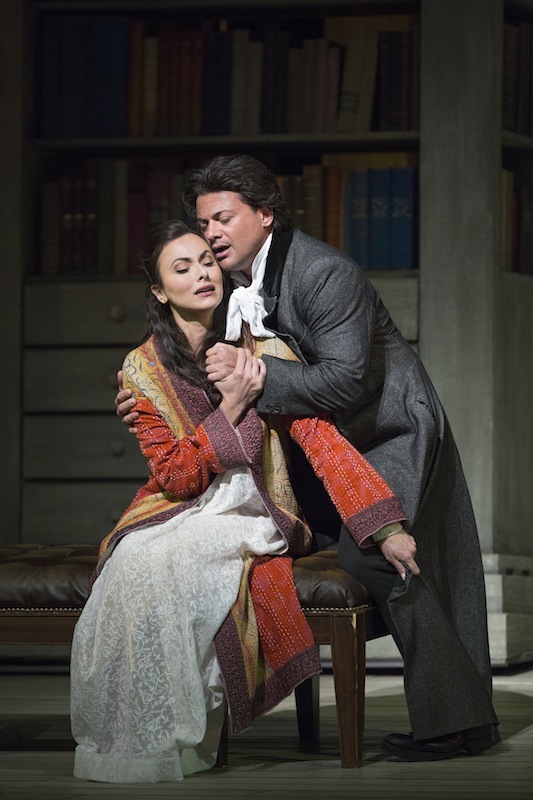Two brilliant stars bring Massenet’s “Werther” to searing life

Vittorio Grigolo and Isabel Leonard in Massenet’s “Werther” at the Metropolitan Opera. Photo: Marty Sohl
The public loves to hate on opera for for its flimsy plots—from mistaken identities to sleepwalking brides, the genre often asks its audiences to indulge a great deal of silliness in the service of music. A notable exception is Massenet’s Werther, the libretto of which actually manages to improve on an original story by Goethe.
For a source text, it’s hard to go wrong with The Sorrows of Young Werther, which was briefly the most popular novel in Europe. Goethe’s epistolary novella tells us the story of an obsessive romantic poet who falls in love with an already betrothed woman and kills himself, believing this will spare here any further grief. The operatic treatment dispenses with the epistolary conceit save for one gripping scene in which we see Charlotte reading Werther’s letters to her–rather than a one-sided romance with an offstage female plot device, we suddenly have a drama with two compelling central characters.
The Metropolitan Opera on Thursday revived Sir Richard Eyre’s 2014 production, an attractive, uncomplicated staging that nonetheless captures the emotional bleakness of the two final acts. In Vittorio Grigolo and Isabel Leonard, the Met has found an extraordinary pair to lead this revival, two gifted singers who are also commanding dramatic presences, each able, in their vastly different ways, to make a single moment seem like the most important thing in the world.
Grigolo has just about perfected his idiosyncratic style of full-bore performance, throwing himself into his work with an intense passion for which he has no brake pedal. This approach doesn’t suit itself to every character–his sociopathic Nemorino springs to mind–but for Werther, whose obsession must carry him to ruin, Grigolo is a natural fit. He started out showing unusual restraint, but once Charlotte appeared onstage it didn’t take long for him to launch into a manic vision of the character, occupied only by his love for her and calmed only by his own death.
This role has a duskier quality overall than others that he’s sung lately at the Met, offering up a different shade in his voice. At the very top of the role, as in his desperately dramatic rendition of the signature aria “Pourquoi me reveiller,” hints of his usual clarion ring came out, but on the whole we heard a darker color appropriate for the brooding poet. Occasionally, when he floated a few of his trademark high pianissimos, it was hard to escape the feeling that he was showing off; yet it was equally hard to blame him, so effective were his musical choices.
Isabel Leonard could hardly be a starker contrast. Where Grigolo is driven by jolting energy that cannot be contained, she is cool and collected, achieving a stunning emotional immediacy in the intimate moments where she lets her guard down. Werther’s great aria notwithstanding, the third act of this opera belongs to Charlotte, and Leonard’s journey from one end to the other was a complete arc unto itself, from her raw, wrenching letter scene to her poignant conversation with her sister Sophie, to her heated confrontation with Werther.
Moreover, Charlotte is a perfect fit for Leonard’s voice at this point. After hearing her in lighter roles throughout her early career, it is quite the shock to hear her sing a role that lives in such a dark part of her voice and to command it with such authority. Some of the shine has come off her top notes, but there is a fierce, dark focus in the middle voice, and bristling fire in her chest. She followed the heartbreaking simplicity of the haunting arietta “Va! Laisse couler mes larmes” with a searing, shiver-inducing expression of rage in “Seigneur Dieu, Seigneur!” Rosinas and Cherubinos are all well and good, but this role feels like a much more complete use of Leonard’s considerable talents.
Anna Christy chirped merrily as Sophie, bringing a lemony brightness and infectious naïveté to the role. Albert, Charlotte’s fiance, is not especially sympathetic in this version of the story, but David Bizic found the humanity of the character, lending a gruff sadness to the husband whose love is never returned.
Maurizio Muraro was endearingly avuncular as the Bailiff, Charlotte’s father showing off a jovial barrel of a voice. Phillip Cokorinos and Tony Stevenson provided welcome comic relief as the heavy-drinking duo of Johann and Schmidt, while Christopher Job and Sarah Larsen showed a vision of what bliss might have been as the young couple Brühlmann and Kätchen.
Edward Gardner led a serviceable, if fitfully uninspired, reading from the pit, losing a handle on the ensemble in spots and lacking muscle in some of the score’s more dramatic moments. This performance, though, is about its leads—as much as Werther gets maligned for a slightly slow start, the vivid drama of the story and of Massenet’s score makes a perfect vehicle for two such singers as Leonard and Grigolo, both brilliant performers moving into the prime of their careers.
Werther runs through March 9 at the Metropolitan Opera. Veronica Simeoni appears as Charlotte on February 23 and Jean-François Borras appears in the title role on March 9. metopera.org






